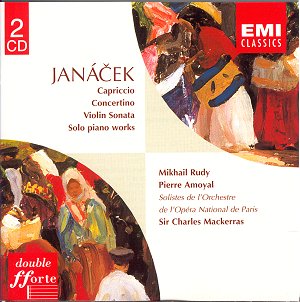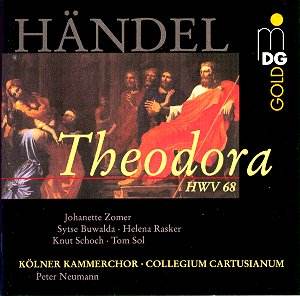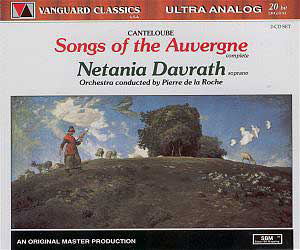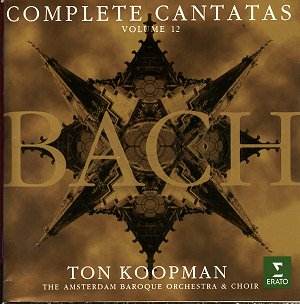 Composer: Florent Schmitt
Composer: Florent Schmitt
Works: La Tragédie de Salomé, Psalm 47, Janiana, Suite en Rocaille, Lied et Scherzo
Performers: Jacques Prat (violin), Sharon Sweet (soprano), Guy Commentale (violin), Jean-Louis Gil (organ), Orchestre Philharmonique et Choeurs de Radio France/Marek Janowski (Salomé, Psalm), Orchestre Jean-François Paillard (Janiana), Marie-Claire Jamet Quintet (Suite), Pierre Del Vescovo (horn), Jean Hubeau (Lied et Scherzo)
Recording: Various recordings, including those from the 1960s and early 1970s
Label: Erato Ultima
Florent Schmitt, a composer whose reputation fluctuates between the shadows of his contemporaries and the luminescence of his innovative orchestral textures, merits renewed attention through this diverse two-CD set. Spanning works from 1904 through 1941, the collection features “La Tragédie de Salomé,” “Psalm 47,” and “Janiana,” alongside smaller chamber pieces that showcase Schmitt’s stylistic evolution and thematic depth. The historical context of these works is especially rich; “La Tragédie de Salomé,” inspired not by Wilde but by Robert d’Humières, emerges as a reaction to the burgeoning modernist landscape of early 20th-century Paris, a time when Schmitt was grappling with influences from Stravinsky and the post-Wagnerian tradition.
The performances, led by Marek Janowski for the choral and orchestral works, exude vitality and depth, even if they occasionally lack the raw abandon that marked Martinon’s earlier interpretations. “La Tragédie de Salomé” unfolds with lush orchestration, where the warm dreamy atmosphere contrasts with moments of stark intensity. The choral passages, particularly the ethereal vocalizations at approximately 7:29 in the second track, are beautifully handled, evoking a distant, haunting quality reminiscent of Delius’s spiritual landscapes. Janowski’s interpretation, while perhaps more restrained than some might prefer, brings clarity and focus to Schmitt’s intricate textures, allowing the audience to appreciate the work’s harmonic and thematic complexities without overwhelming the listener.
In “Psalm 47,” the sheer power of the massed voices is striking. Here, Schmitt’s dramatic flair is on full display, particularly in the exuberant outer sections, though they occasionally succumb to rhythmic predictability that recalls Vaughan Williams. Yet, the central panel, showcasing Commentale’s sensitively febrile violin work against the imposing choral backdrop, creates a moment of sublime beauty that highlights Schmitt’s ability to weave intimate expressiveness into grand musical statements. The recording quality from EMI-Pathé-Marconi captures this grandeur effectively, though some nuances may be overshadowed by the mass of sound, a common challenge in choral works of this magnitude.
“Janiana,” composed during the Occupation, reveals a more introspective side of Schmitt’s style. The work flows through a tapestry of emotions, showcasing a tonal language that is both engaging and accessible. It is enriched by the dynamism of its concluding movement, which distills a sense of urgency and poignancy, qualities that resonate with Herrmann’s later cinematic scores. The performance by Jean-François Paillard’s orchestra is commendable, traversing the spectrum of sentiment with a deft hand, though the sound engineering from the mid-1960s is less pristine than the contemporary remastering of “La Tragédie” and “Psalm.”
The chamber works, particularly “Suite en Rocaille” and “Lied et Scherzo,” present a delightful contrast to the larger orchestral pieces. Jamet’s quintet navigates the delicate intricacies of “Suite en Rocaille” with a soft touch, reminiscent of Ravel’s influences yet distinctly Schmitt. The “Lied et Scherzo,” dedicated to Dukas, captures the essence of early 20th-century dissonance without straying into the extremes of the avant-garde, showcasing a charming balance between lyricism and rhythmic playfulness.
This collection serves as both an introduction to and a reaffirmation of Schmitt’s substantial contributions to the early modern repertoire. While it may not exhaustively represent his output, the thoughtful selection of works and their compelling performances invite listeners to explore the richness of his musical language. For those seeking to understand the nuances of this often-overlooked composer, these recordings offer an invaluable and engaging listening experience.



